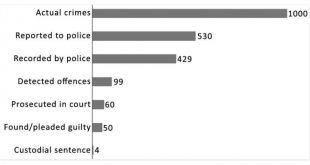[unable to retrieve full-text content]More than half the world lives in cities, and a lot of those cities (especially those in the Americas) are plagued with homicides and crime. Americans often think this violence is an individual problem: greed, passions, feuds, and hot reactive thinking drive killers. That’s true to an extent. But this view overlooks something important: that, […] The post The terrible trade-off: Why less violent cities often means more powerful and organized...
Read More »Defunding the police is the wrong question
How can we get more ‘output,’ and of the right sort, from policing? The question has only taken on greater importance with recent, widely publicized instances of police misconduct; declines in public trust in police; and a rise in gun violence, all disproportionately concentrated in economically disadvantaged communities of color. Research typically focuses on two levers: (1) police resources, and (2) policing strategies or policies, historically focused on crime control but increasingly...
Read More »Defunding the police is the wrong question
How can we get more ‘output,’ and of the right sort, from policing? The question has only taken on greater importance with recent, widely publicized instances of police misconduct; declines in public trust in police; and a rise in gun violence, all disproportionately concentrated in economically disadvantaged communities of color. Research typically focuses on two levers: (1) police resources, and (2) policing strategies or policies, historically focused on crime control but increasingly...
Read More »When the Law is Part of the Problem
Whether it be by legislative intent, or due to some interpretation of the law by a judge or by the supreme court; behind each incidence of police brutality, shooting of an unarmed person, or other unwarranted police behavior in America, lies the question of how is it the law of the land allows law enforcement officers to act with relative impunity? Of course, there is the question of whether the law does indeed allow law enforcement officers to use...
Read More »IPA’s weekly links
Guest post by Jeff Mosenkis of Innovations for Poverty Action Professor Lisa Cook explains that black and white inventors put in equivalent numbers of patent applications once in 1899, and never again. First, a great webinar by Professor Lisa Cook, former economic advisor to President Obama, among many other accomplishments, on how lynchings, violence, and discrimination caused African-American inventions (measured by patent applications) to peak in 1899 and never recover. Here’s the video...
Read More »IPA’s weekly links
Guest post by Jeff Mosenkis of Innovations for Poverty Action Stanford Political Scientist Hakeem Jefferson hosted a great conversation with a number of scholars on race and the criminal justice system [embedded content] The readings mentioned are assembled in this Dropbox folder and thread, and the Stanford Daily summarized the conversation. A couple of points that jumped out at me were what counts as research/evidence in academic research circles (it seems common for scholars of the black...
Read More »Crime and Punishment
I stumbled on a blog post by Jerry Ratcliffe, who is a Professor of Criminal Justice and Director of the Center for Security and Crime Science at Temple University, Philadelphia, and a former police officer with London’s Metropolitan Police (UK). From one of this posts: Graph no. 2 is another image from my Intelligence-Led Policing book. The crime funnel represents what happens to a random selection of 1,000 crimes that affect the public (top bar). It...
Read More »Why Don’t Giuliani’s Critics Attack Him For What He Actually Said?
Part 6 of my series on Race, Crime, and Policing William K. BlackAugust 7, 2016 Bloomington, MN Former NYC Mayor Rudy Giuliani made a series of comments on race, crime, and policing on when he was interviewed recently on “Face the Nation.” I am a strong critic of Giuliani’s approach to the intersection of race, crime, and policing. Giuliani said several objectionable things in his interview that he could not defend. The mystery is why his critics keep ignoring those comments and...
Read More »Michael Eric Dyson’s Blood Libels and History
Part 5 of my series on Race, Crime, and Policing William K. BlackAugust 5, 2016 Bloomington, MN I explained in my two prior columns the blood libels against “whites” as a race and law enforcement officers (LEOs) made by the sociologist Michael Eric Dyson. Dyson was particularly vitriolic in complaining that whites refused to “condemn” LEOs who shot blacks until they knew whether the LEOs had acted criminally or even improperly. Dyson portrays this adherence to due process and the rule...
Read More »Michael Eric Dyson’s Blood Libels and the NYT’s Hypocrisy
Part 4 of my series on Race, Crime, and Policing William K. BlackAugust 2, 2016 Bloomington, MN Part 3 of this series began the explanation of the hypocrisy of the New York Times in its treatment of the sociologist Michael Eric Dyson’s blood libels against police and whites as a race. Part 3 focused on the terrible timing of Dyson’s op ed in the NYT. The ambush murders of Dallas law enforcement officers (LEOs) falsified Dyson’s blood libels while the ink was still figuratively wet on...
Read More » Heterodox
Heterodox

